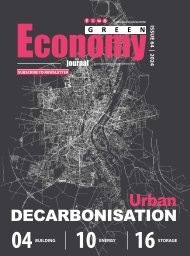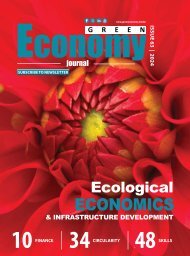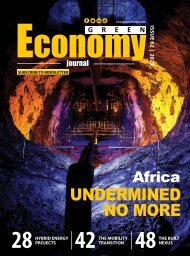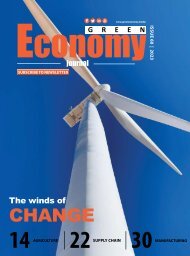You also want an ePaper? Increase the reach of your titles
YUMPU automatically turns print PDFs into web optimized ePapers that Google loves.
ECONOMY<br />
ECONOMY<br />
Southern Africa’s<br />
ABUNDANT RESOURCES<br />
can fuel a successful<br />
GREEN ECONOMY<br />
with climate change are: mitigation which contributes to the reduction<br />
of greenhouse gases; adaptation to the realities of climate change<br />
and means of implementation which translates to allocating financial<br />
and technical resources to execute climate change responses.<br />
Thus the importance of the decisions taken at the international<br />
climate talks in Egypt at the end of 2022, especially the historic decision<br />
to establish a fund to assist developing countries to respond to loss<br />
and damage caused by climate change. South Africa had emphasised<br />
the importance of the need for the fundamental transformation and<br />
modernisation of the global financial architecture and reform of the<br />
multilateral development banks to make them fit-for-purpose in<br />
supporting sustainable development and just transitions.<br />
The final COP27 outcome frames the climate crisis and its solutions<br />
in terms of the sustainable development goals and just transitions,<br />
leaving no-one behind, and the need for broader financial sector<br />
reform to achieve these.<br />
The latest climate science documented in the Sixth International Panel on Climate Change<br />
Report released in April 2022 documents the physical risk that climate change poses to<br />
southern African countries and cautions that its impact is already denting economic growth.<br />
BY THE DEPARTMENT OF FORESTRY, FISHERIES AND THE ENVIRONMENT<br />
The report explains the Earth’s average surface temperature<br />
has already warmed by over one degree centigrade since preindustrial<br />
times. Furthermore, southern Africa is warming at<br />
twice the average global rate and the report estimates temperature<br />
increases of over two degrees centigrade.<br />
What is known with certainty is that climate change is already<br />
part of the lived reality of millions: floods, severe storms, drought,<br />
heatwaves and uncontrolled fire impact in the South African region and<br />
has already threatened lives, agricultural production, water security,<br />
tourism, health, infrastructure, ecosystems and biodiversity.<br />
In addition to the physical risk, southern African economies also<br />
face a transition risk associated with climate change. As the major<br />
economies transition to new green technologies they will seek to<br />
protect their investments by introducing trade barriers to goods<br />
and services produced in economies with a higher carbon footprint.<br />
The South African economy, with its reliance on coal-fired energy<br />
generation, is most at risk.<br />
In the shift to more sustainable industries, be they in mining,<br />
manufacturing or electricity generation, South Africa needs to ensure<br />
that it, and the region, is not left behind. Southern Africa is uniquely<br />
positioned to benefit from the opportunities in the green economy.<br />
This will require a paradigm shift in the approach to development<br />
and government priorities so that the contribution to greenhouse gas<br />
emissions can be mitigated and the region can begin the long road to<br />
adapting to the impacts that lie ahead.<br />
Because government is aware that climate change affects all sectors<br />
of society, business and government, ways are being found to develop<br />
a whole-of-society response that will allow all interested parties and<br />
stakeholders to participate.<br />
In this regard, the Presidential Climate Commission, representing<br />
government, business, organised labour and civil society can now<br />
boast its role in developing South Africa’s revised Nationally<br />
Determined Contributions, concluding the Just Transition Framework<br />
and researching pathways for transitioning several sectors of South<br />
Africa’s economy severely impacted upon by climate change.<br />
Besides the Commission, overarching framework legislation will<br />
be important for SADC countries to guide all levels of government,<br />
multiple departments and different stakeholders within a common<br />
climate change response strategy.<br />
South Africa’s experience has shown that one can only achieve so<br />
much on a voluntary basis. In developing countries with limited budgets<br />
and infinite need, and without a regulatory environment, climate<br />
priorities always fall lower down the agenda. Thus the importance<br />
of the Climate Change Bill presently before Parliament.<br />
The Paris Agreement to which the SADC countries are signatories<br />
requires participating governments to take three measures to deal<br />
Southern Africa<br />
is uniquely<br />
positioned to<br />
benefit from the<br />
opportunities in<br />
the green economy.<br />
The call for multilateral consensus on making financial flows<br />
consistent with pathways towards low emissions and climate resilient<br />
development could open new investment opportunities in Africa for<br />
clean energy investments, critical for addressing energy poverty on<br />
the continent. The climate talks have also seen agreement amongst<br />
parties to accelerate work on reducing vulnerability of societies due to<br />
climate change impacts.<br />
Within SADC, the adoption of the regional Climate Change Strategy<br />
and Action Plan (2020-2030) in 2021 in identifying key sectors that<br />
can contribute to the transition to a low-carbon, climate-resilient<br />
future, acknowledges that the region’s forestry resources have the<br />
potential to act as significant carbon sinks. This is but one of the<br />
sectors being considered in SADC’s planning towards the greening of<br />
the regional economy in the hope of meeting development objectives<br />
and mainstreaming climate change adaptation.<br />
Southern Africa has abundant resources that must be employed<br />
in our transition to a low-carbon future and the development of a<br />
successful green economy.<br />
14<br />
15


















